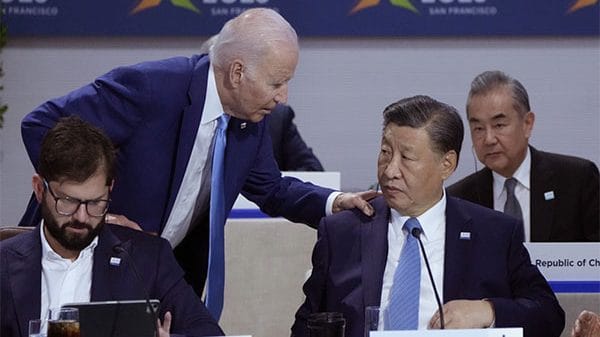Of all bilateral relations, the one between the US and China is the most consequential, and of all geopolitical regions, the outgoing Biden administration has placed its bets on the Indo-Pacific. These final months of the Biden presidency will be a time to build his legacy before the baton passes to the next administration in January 2025. This is where US National Security Adviser Jake Sullivan’s recent trip to China and US Secretary of State Antony J Blinken’s earlier Asia trip come into play. They testify the last mile efforts of Biden’s foreign policy and national security team to pave the future of US-China relations and America’s partnerships in the Indo-Pacific to manage China’s rise.
Despite raging wars in Europe and West Asia, which strain American resources, multiple US government agencies have made it clear that China’s rise in the Indo-Pacific poses the most significant challenge to America’s global primacy. Hence, these visits, with Blinken travelling to six countries.
An editorial in the Global Times preceding Sullivan’s China visit commented that, despite having many channels of communication, the US “has not reduced its actions to contain and suppress China, constantly eroding the hard-earned consensus and mutual trust between the two countries.” Washington and Beijing stand at a critical juncture in negotiating the future course of their bilateral relationship. The competition is pitched as a contest between “democracies vs autocracies,” with both sides accusing the other of endangering peace and stability in the Indo-Pacific. Both the Democratic and Republican presidential nominees view China as the most critical foreign policy challenge, though they accuse each other of failing to execute a strong American response. Sullivan reportedly told Chinese officials that Kamala Harris, as part of the Biden team, might continue managing competition and cooperation while arresting confrontational streaks.
The Biden administration’s national security strategy views China as the only country with the capability and intention to pose long-term challenges to America’s primacy. Irrespective of who wins the election in November, this broad strategic perception will not change. In Beijing, no such change in political leadership will happen anytime soon, and therefore the view that American hegemonic tendencies threaten regional peace and stability in the Indo-Pacific will not change.
Key issues, strategic challenges
Trade, technology, and Taiwan continue to dominate high-level communication between the two countries. From the Trump to the Biden administration, the US has accused China of unfair trade practices, imposed high tariffs, and restricted Chinese high-tech products due to national security concerns. Dual-use technologies, which have both military and commercial applications, further complicate the intersection of security and business, with the call to ban Tiktok operations in the US being a glaring example.
High-level military-to-military communication remains crucial to prevent unintended confrontations and miscalculations that could escalate into conflicts. Sullivan, during his press conference in Beijing, noted that the “deepening of the military-to-military communication” will be passed “on to President Biden’s successor.” “And, in fact, a very positive outcome of the sessions here is that there will be a call between the theater commanders, the INDOPACOM commander and the Southern Theater commander for the PLA,” he said.
The Chinese government considers the Taiwan issue as “the first insurmountable red line” in US-China relations. During his recent meeting with Sullivan, General Zhang Youxia, Vice-Chair of China’s Central Military Commission, accused Washington of colluding with Taiwan, which goes against China’s “reunification” mission. Sullivan, in response, doubled down on freedom of navigation and maintenance of peace in the Taiwan Strait. Besides, China’s territorial transgression in the South China Sea and aggressive tactics against countries like the Philippines remain areas of widening disagreement. In a bid to reassure allies and partners, Secretary Blinken, NSA Sullivan, and US Secretary of Defense Lloyd Austin jointly wrote an Op-ed in The Washington Post last month, contending that Biden’s Indo-Pacific strategy had upgraded the old “hub and spoke” alliance to a new model of integrated and interconnected network of partnerships.
Moreover, the growing alliance between Russia and China and their anti-West postures, including Moscow’s support for China’s position on Taiwan and joint opposition to US Indo-Pacific strategy, remain a potent strategic challenge for the United States, which faces a new sort of two-front Cold War. Washington has also called out China’s support for Russia’s defence industrial base, which has substantial repercussions for the Ukraine war.
As the US presidential election heats up, candidates Kamala Harris and Donald Trump will target China’s political and economic practices, and spar over who can best handle Beijing as the next US President. However, once the election dust settles down, the threads of the Biden presidency will need to be picked up to shape the next steps in US-China bilateral relations, and America’s Indo-Pacific strategy. In this sense, Blinken’s Asia visit and Sullivan’s China trip aimed at affirming the continuity of America’s foreign policy and strategic objectives in the Indo-Pacific, despite the vicissitudes of domestic US politics.
Monish Tourangbam is Director at the Kalinga Institute of Indo-Pacific Studies (KIIPS). Views are personal.
(Edited by Prashant)






